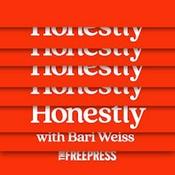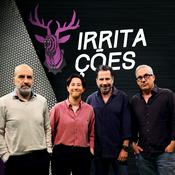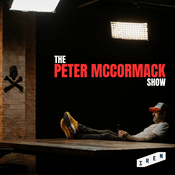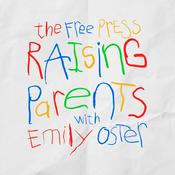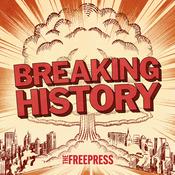359 episódios
What to Expect in 2026 with Niall Ferguson, John McWhorter, Dr. Mark Hyman, Leandra Medine Cohen, Suzy Weiss, and Sarah Isgur
31/12/2025 | 2h 29minThis past year wasn’t easy—but it was certainly eventful. Donald Trump returned to the White House, issued a record number of executive orders, deployed the National Guard to American cities—like LA and D.C.—imposed sweeping tariffs on all our trading partners, gutted the government with the Department of Government Efficiency (DOGE), and unleashed a massive crackdown on immigration.
But that was only the beginning.
The administration also reached a ceasefire between Israel and Hamas—and all the living hostages came home from Gaza. Israel and the United States struck Iran’s nuclear sites. We got the first American pope. And we haven’t even started listing the pop-culture moments, like the Sydney Sweeney jeans ad, the Travis Kelce–Taylor Swift engagement, or when Lauren Sánchez Bezos and Katy Perry went to space. There was truly so much, and if we kept going we’d be here all day.
But this, after all, is a prediction episode. So what will 2026 bring?
Bari and Free Press deputy editor Olly Wiseman called up some friends of the pod—and experts in their fields—to get a better sense of what’s in store for the year ahead.
They spoke to political analyst and legal expert Sarah Isgur, who told them what to expect in Trump’s second year; to Suzy Weiss on the cultural calendar ahead; to linguist John McWhorter on how new words and language will evolve; to Dr. Mark Hyman on how to get healthier in 2026; to writer and fashionista Leandra Medine Cohen on fashion trends to watch for; and to historian Niall Ferguson on whether or not we’re right to have nightmares about World War III.
Learn more about your ad choices. Visit megaphone.fm/adchoices- It's Christmas Eve. A holiday celebrated by 2.4 billion people around the world, which centers on a 2,000-year-old story about a Jewish man born in Bethlehem who became a rabbi, who the Romans would later execute in Jerusalem.
But what most people don’t know is that the first people who believed in Jesus did not think they were starting a new religion. They were a small group of Jews who thought of themselves as history's last generation, with Jesus as their Messiah.
Of course, as we all know now, they were not history’s last generation. Instead, they became history's first Christians. How did that happen? When did Christ's followers begin to see themselves as distinct and separate from Judaism? Why did some Jews refuse to accept Christ as the Messiah? And how was that refusal, and the anti-Judaism of the early Christians, directly connected to the antisemitism burning across the globe today?
These first few centuries are essential for understanding not just Christianity and Judaism, but the way ideas spread, and why many of the ideas of this period—good ones, and also some very bad ones—still persist in our world today.
My guest today, Paula Fredriksen, has spent her career studying this period of history. She is one of the world’s leading scholars of early Christianity and the author of many books including: When Christians Were Jews: The First Generation, Paul: The Pagans’ Apostle, and Ancient Christianities: The First Five Hundred Years.
Paula was born in Rhode Island and now lives in Jerusalem, just 20 minutes from Golgotha, where Jesus was crucified.
This conversation is a Christmas special you won’t want to miss.
The Free Press earns a commission from any purchases made through all
book links in this article.
Learn more about your ad choices. Visit megaphone.fm/adchoices - Last week, Bari sat down with Erika Kirk for an hour-long town hall in front of a live audience on CBS.
It was an extremely powerful conversation. Erika and Bari spoke about a lot—rising political violence in this very divided country; the way some people justified or excused Charlie’s murder; what Erika thinks about some of the controversial things Charlie said in his lifetime; her response to Candace Owens and the conspiracy theories Owens and others are peddling; the growing antisemitism on the right; and her decision to forgive Charlie’s killer.
They also talked about the posthumous release of Charlie’s last book, Stop, in the Name of God: Why Honoring the Sabbath Will Transform Your Life.
This town hall was the first of many conversations and debates Bari will be bringing to CBS News about the things that matter most. Which, of course, are often the hardest to talk about. We really hope you will tune in.
In case you missed this first one with Erika Kirk, we’re thrilled to share the conversation here on Honestly. And we can’t wait for you to catch the next one on CBS News.
The Free Press earns a commission from any purchases made through all book links in this article.
Learn more about your ad choices. Visit megaphone.fm/adchoices - One of the most complex medical, ethical, moral, and religious questions of our era is that of physician-assisted suicide—also known as Medical Aid in Dying, or MAID.
Eleven U.S. states and Washington, D.C. have legalized some form of MAID for terminally ill patients. And New York might join them.
Over the summer, a Medical Aid in Dying Act passed New York’s state legislature. It is now sitting on Governor Kathy Hochul’s desk as she decides whether to sign it into law.
Under the proposed New York bill, terminally ill adults with a prognosis of six months or less to live would be able to access a prescribed, self-administered life-ending medication.
Supporters argue that this is a compassionate option—one that can relieve people of immense pain and suffering, allowing patients to choose when and where they die, and to do so surrounded by loved ones.
Opponents see this as a violation of physicians’ fundamental oath to do no harm. They also worry that while access may begin narrowly, it could expand over time to include people seeking death for reasons other than terminal illness—such as mental suffering or simply a desire to stop living. Cases like this have already occurred in Belgium, the Netherlands, Canada, and Switzerland.
Rafaela Siewert sat down with two experts who see this topic very differently for a heated debate.
David Hoffman is a healthcare attorney, clinical ethicist, and professor of bioethics at Columbia University. He argues that hypothetical future abuses of MAID shouldn’t outweigh the needs of terminal patients who need this option now.
Dr. Lydia Dugdale is a physician, medical ethicist, and professor of medicine at Columbia University. In her view, legalizing this practice of physician-assisted suicide risks undermining the responsibilities of governments, medical systems, and families to care for the mentally ill, the poor, and the physically disabled. And she fears that the potential for excessively expanded access over time is too great.
We are among the many Americans who do not know what the right answer is. We see both sides—which is why grappling with the nuances of this subject is so important.
This is a debate you won’t want to miss.
Learn more about your ad choices. Visit megaphone.fm/adchoices
Mais podcasts de Notícias
Podcasts em tendência em Notícias
Sobre Honestly with Bari Weiss
The most interesting conversations in American life happen in private. This show brings them out of the closet. Stories no one else is telling and conversations with the most fascinating people in the country, every week from The Free Press, hosted by former New York Times and Wall Street Journal journalist Bari Weiss.
Sítio Web de podcastOuve Honestly with Bari Weiss, Miguel Sousa Tavares de Viva Voz e muitos outros podcasts de todo o mundo com a aplicação radio.pt
Obtenha a aplicação gratuita radio.pt
- Guardar rádios e podcasts favoritos
- Transmissão via Wi-Fi ou Bluetooth
- Carplay & Android Audo compatìvel
- E ainda mais funções
Obtenha a aplicação gratuita radio.pt
- Guardar rádios e podcasts favoritos
- Transmissão via Wi-Fi ou Bluetooth
- Carplay & Android Audo compatìvel
- E ainda mais funções

Honestly with Bari Weiss
Leia o código,
descarregue a aplicação,
ouça.
descarregue a aplicação,
ouça.
